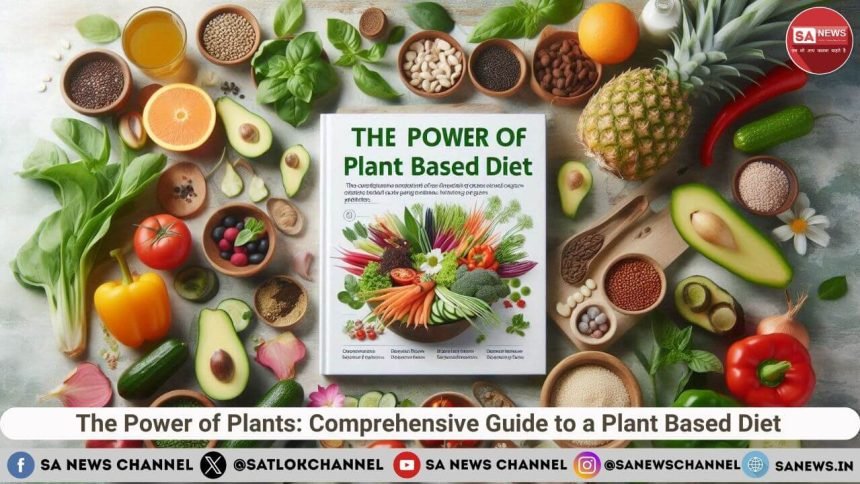Plant based diet i.e. eating only things obtained from plants is very beneficial for health, it reduces the risk of many diseases. In recent years, the world has witnessed a significant shift towards plant-based eating, with more individuals adopting a diet rich in fruits, vegetables, and whole grains. This trend is driven by growing concerns about health, environmental sustainability, and animal welfare. In this article, we will learn about the benefits of a plant-based diet, explore the variety of plant-based foods, and provide practical tips for transitioning to a plant-based lifestyle.
- Benefits of a Plant-Based Diet
- What to Eat on a Plant-Based Diet?
- Some tasty plant-based meal ideas include:
- Common Concerns and Debunking Myths of eating plant based diet
- Is a vegan or Plant based Diet the same thing?
- What are Some Nutrient-Dense Plant-Based Foods?
- How can one transition to a plant based diet?
- Plant-Based Diet for Specific Needs
- Plant-Based Diet and Mental Health
- What are the Common Plant-Based Diet Mistakes one can avoid?
- Is a plant based diet healthy or not?
- Do healthcare professionals advise patients to follow a plant based diet?
- Plant based diet reduces the risk of many diseases
- How a Plant Based Diet Can Help Save the Environment?
- Encourage Compassion and Plant-Based Living
- FAQs on plant based diet
- Q1: What is a plant-based diet?
- Q2: Do I need to be a vegan to follow a plant-based diet?
- Q3: Will I get enough protein on a plant-based diet?
- Q4: Is a plant-based diet expensive?
- Q5: Can I get all the necessary nutrients on a plant-based diet?
- Connect With Us on the Following Social Media Platforms
Benefits of a Plant-Based Diet
A well-planned plant-based diet offers numerous health benefits, including:
- Reduced risk of heart disease
- Lower blood pressure
- Improved blood sugar control
- Weight loss
- Reduced risk of certain cancers
- Improve gut health
In addition to these health benefits, a plant-based diet is also a sustainable choice for the environment. Animal agriculture significantly contributes to greenhouse gas emissions, deforestation, and water pollution. By choosing plant-based options, individuals can reduce their carbon footprint and support eco-friendly agriculture.
What to Eat on a Plant-Based Diet?
A plant-based diet is not restrictive; it’s a vibrant and diverse way of eating. Focus on whole, minimally processed foods, including:
- Fruits
- Vegetables
- Legumes (beans, lentils, peas)
- Whole grains (brown rice, quinoa, whole wheat)
- Nuts and seeds
- Healthy fats (avocado, olive oil)
Plant-based protein sources include legumes, tofu, tempeh (an Indonesian dish made by deep- frying fermented soya beans), and seitana (chewy protein-rich food made from wheat gluten, used in cooking as a meat substitute). Healthy fats can be found in nuts, seeds, avocados, and olive oil.
Some tasty plant-based meal ideas include:
- Breakfast: oatmeal with fruit, smoothie bowls, whole grain toast with avocado
- Lunch: salads, wraps, lentil soup, vegan sushi
- Dinner: pasta primavera (served with a mixture of fresh vegetables such as zucchini, snow peas, and broccoli), stir-fries, vegan curries, roasted vegetables
Common Concerns and Debunking Myths of eating plant based diet
- One of the most common concerns about a plant-based diet is protein intake. However, plant-based protein sources are abundant, and a well-planned diet can provide all the essential protein.
- Another myth is that a plant-based diet is expensive. While some specialty products may be pricier, whole plant-based foods are often affordable and budget-friendly.
Is a vegan or Plant based Diet the same thing?
While often used interchangeably, “vegan” and “plant-based” have slightly different meanings:
Vegan:
A vegan diet excludes all animal products, including:
- Meat, fish, and poultry
- Dairy products (milk, cheese, eggs)
- Honey
- Any food derived from animals (gelatin, whey, casein)
- Often, vegans also avoid using products made from animals (leather, silk, wool) and avoid products tested on animals.
Plant-based:
A plant-based diet focuses on eating plants, including:
- Fruits
- Vegetables
- Legumes
- Grains
- Nuts and seeds
- Plant-based milk and other alternatives
- Plant-based diet may include small amounts of animal products (honey, dairy) or may be fully vegan.
In summary, all vegan diets are plant-based, but not all plant-based diets are vegan. Plant-based is a broader term that emphasizes eating plants, while veganism is a specific lifestyle choice that excludes all animal products.
What are Some Nutrient-Dense Plant-Based Foods?
Some nutrient dense plant based foods are
- Leafy greens (spinach, kale, collard greens)
- Berries (blueberries, strawberries, raspberries)
- Legumes (lentils, chickpeas, black beans)
- Nuts and seeds (almonds, chia seeds, flaxseeds)
- Whole grains (quinoa, brown rice, whole wheat)
How can one transition to a plant based diet?
A plant-based diet is a powerful choice for individuals and the planet. By embracing a diet rich in whole, plant-based foods, one can improve health, support sustainable agriculture, and promote animal welfare. It can be easy and delicious, you can start with small changes, such as:
- Start with small changes
- Experiment with new recipes
- Start adding a serving of legumes to your meals
- Experimenting with new recipes
- Find plant-based communities for support
- Consult with a registered dietitian or healthcare professional
Plant-Based Diet for Specific Needs
- In Pregnancy and breast-feeding: Focus on whole grains, legumes, and dark leafy greens for essential nutrients.
- Athletes and fitness enthusiasts: Include protein-rich plant-based foods like legumes, tofu, and tempeh to support muscle growth and fast recovery.
- Children and teenagers: Encourage a variety of plant-based foods to support growth and development.
Plant-Based Diet and Mental Health
- Reduce symptoms of anxiety and depression with a diet rich in fruits, vegetables, and whole grains.
- Improve mood and cognitive function with omega-3 fatty acids in walnuts, chia seeds, and flaxseeds.
What are the Common Plant-Based Diet Mistakes one can avoid?
- Inadequate protein intake: Include a variety of plant-based protein sources in your diet.
- Insufficient vitamin B12: Consider supplements or fortified plant-based milk.
- Over reliance on processed foods: Focus on whole, minimally processed foods.
Is a plant based diet healthy or not?
Adopting a plant based diet offers numerous health benefits, extending far beyond cancer prevention. By focusing on whole, plant-based foods, you can significantly lower your risk of developing various chronic diseases, including heart disease, stroke, and diabetes. Additionally, a plant based diet has been linked to a reduced risk of certain mental health conditions, demonstrating the profound impact of dietary choices on overall well-being.
Do healthcare professionals advise patients to follow a plant based diet?
Medical professionals, including doctors and dietitians, recommend a plant based diet due to the well-documented health risks linked to animal product consumption. The scientific consensus is clear: a diet rich in plant-based foods and low in animal products, especially red and processed meats, can significantly reduce the risk of chronic diseases. As the evidence continues to mount, healthcare professionals are increasingly advising patients to adopt a plant based diet as a proactive approach to maintaining optimal health and preventing illness.
Plant based diet reduces the risk of many diseases
A well-planned plant based diet has been shown to reduce the risk of many diseases, including:
- Heart disease
- Stroke
- Type 2 diabetes
- Certain types of cancer (e.g., colon, breast, prostate)
- Obesity
- High blood pressure
- Kidney disease
- Osteoporosis
- Alzheimer’s disease
- Some mental health conditions (e.g. depression, anxiety)
Plant based diets tend to be high in fiber, vitamins, minerals, and antioxidants, which can help protect against chronic diseases. Additionally, plant based diets often have lower levels of saturated fat, cholesterol, and sodium, which can further reduce disease risk.
■ Also Read: Unnoticed Miracle of God: The Human Physiology and Anatomy
It’s important to note that a well-planned plant based diet is essential to reap these benefits. Simply following a plant based diet without proper planning may lead to nutrient deficiencies. Consult with your doctor or registered dietitian for personalized guidance.
How a Plant Based Diet Can Help Save the Environment?
By choosing to eat plant-based options, we can lower our carbon footprint and support eco-friendly practices. Buying locally sourced, organic produce also promotes sustainable agriculture and reduces transportation emissions. Plus, plant-based protein sources like legumes require less water to produce than animal-based options, helping to conserve this precious resource. By making these simple changes, we can contribute to a more sustainable food system and a healthier planet.
Encourage Compassion and Plant-Based Living
A plant-based diet is a powerful choice for individuals and the planet. By embracing a diet rich in whole, plant-based foods, anyone can improve their health, support sustainable agriculture, and promote animal welfare.
Spiritual Leader Sant Rampal Ji Maharaj ji is renowned for His unwavering compassion towards animals, making Him a unique Spiritual Leader. His universal teachings transcend religious boundaries, emphasizing the importance of kindness and empathy towards all living beings. He provides scriptural evidence that highlights the divine directive to treat animals with respect and refrain from consuming them, promoting a lifestyle of non-violence and harmony with nature. He presented evidence from the holy scriptures to show His respect towards the Constitution of God.
Evidence from Quran
- “And the earth We have spread out (like a carpet); set thereon mountains firm and immovable; and produced therein all kinds of things in due balance.” (Quran 31:10)
- “And We have certainly honored the children of Adam and carried them on land and sea and provided for them of the good things and preferred them over much of what We have created, with [definite] preference.” (Quran 17:70)
Evidence from Bible
- “And God said, ‘Behold, I have given you every plant yielding seed that is on the face of all the earth, and every tree with seed in its fruit. You shall have them for food.'” (Genesis 1:29)
- “And to every beast of the earth and every bird of the heavens and to everything that creeps on the earth, everything that has the breath of life, I have given every green plant for food.'” (Genesis 1:30)
Sant Rampal Ji Maharaj’s teachings emphasize the importance of living a compassionate lifestyle, which includes adopting a plant-based diet. He interprets the Quran and Bible as teachings that God did not intend for humans to eat animals, but rather to live in harmony with all creation.
By following a plant-based diet, we can promote sustainability, reduce harm to animals, and live in greater alignment with God’s will. Sant Rampal Ji Maharaj’s message is one of universal love and compassion, encouraging all individuals to make choices that promote the well-being of all living beings. Follow for more such articles on www.sanews.in
FAQs on plant based diet
Q1: What is a plant-based diet?
A1: A plant-based diet is a way of eating that focuses on whole, minimally processed plant foods, excluding or minimizing animal products.
Q2: Do I need to be a vegan to follow a plant-based diet?
A2: No, you don’t need to be a vegan to follow a plant-based diet as vegans exclude all animal products.
Q3: Will I get enough protein on a plant-based diet?
A3: Yes, plant-based protein sources like legumes, beans, lentils, tofu, and tempeh provide all the necessary protein for good health.
Q4: Is a plant-based diet expensive?
A4: Not necessarily, Whole plant-based foods like grains, beans, and vegetables are often affordable and budget-friendly.
Q5: Can I get all the necessary nutrients on a plant-based diet?
A5: Yes, a well-planned plant-based diet can provide all the necessary nutrients for good health. However, it’s essential to consult with a registered dietitian or doctor to ensure you’re getting everything you need.









